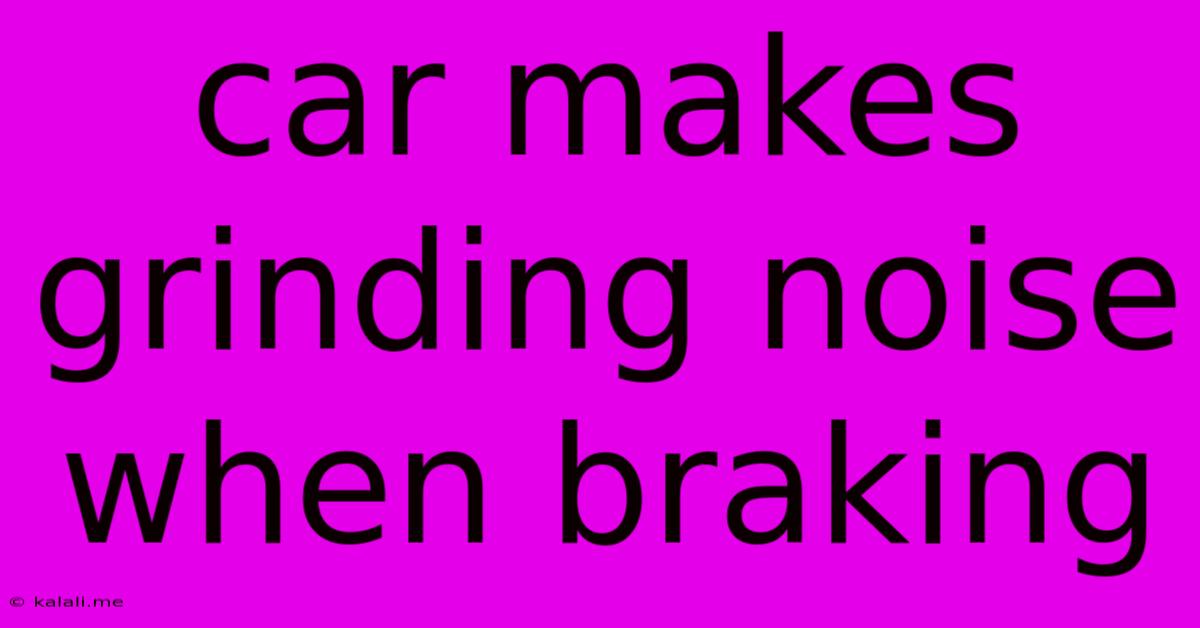Car Makes Grinding Noise When Braking
Kalali
May 23, 2025 · 3 min read

Table of Contents
Car Makes Grinding Noise When Braking: Causes and Solutions
Meta Description: Hearing a grinding noise when braking? This comprehensive guide explores common causes, from worn brake pads to more serious issues, helping you diagnose and fix the problem safely.
A grinding noise when braking is never a good sign. It indicates a problem with your braking system that needs immediate attention. Ignoring it could lead to more serious damage, reduced braking effectiveness, and potentially dangerous driving situations. This article will help you understand the potential causes of this unsettling sound and guide you towards the necessary solutions.
Common Causes of Grinding Noise When Braking
Several factors can contribute to a grinding noise emanating from your brakes. Let's explore some of the most frequent culprits:
-
Worn Brake Pads: This is the most common cause. As brake pads wear down, the metal backing plate comes into contact with the rotor, creating a high-pitched grinding sound. This is usually accompanied by a noticeable decrease in braking performance. Regular brake inspections are crucial to prevent this.
-
Worn Rotors: Brake rotors, the metal discs that the brake pads clamp onto, can also wear down over time. Grooves, scoring, or excessive wear can cause a grinding sound, especially during braking. Worn rotors often need replacing, alongside new brake pads.
-
Stuck Caliper: A brake caliper is responsible for applying pressure to the brake pads. If a caliper becomes stuck or seized, it can cause the brake pads to remain in contact with the rotor, leading to a constant grinding noise, even when not braking. This can also cause overheating and brake fade.
-
Foreign Objects: Sometimes, small stones, pebbles, or other debris can become lodged between the brake pads and the rotor, creating a grinding or scraping noise. This is usually a less severe issue and often resolves itself after a short drive.
-
Damaged Brake Components: More serious issues like damaged brake drums (in drum brake systems), broken caliper components, or even a warped rotor can also contribute to grinding noises. These require professional inspection and repair.
Diagnosing the Problem
While it's impossible to diagnose the precise issue without a proper inspection, you can perform some basic checks:
-
Visual Inspection: Carefully examine your brake pads and rotors. Look for significant wear, scoring, or damage. You might need to remove the wheel to get a clear view.
-
Listen Carefully: Pay attention to when the grinding occurs. Is it constant, only when braking hard, or only at low speeds? This can help pinpoint the source.
-
Feel the Brakes: Do you feel any vibrations in the brake pedal or steering wheel while braking? Vibrations often accompany warped rotors.
Solutions and When to Seek Professional Help
-
Replacing Brake Pads: This is a relatively straightforward job for experienced DIYers. However, ensure you use the correct pads for your vehicle's make and model.
-
Replacing Brake Rotors: Replacing rotors is more involved and often requires specialized tools. It's generally recommended to have this done by a professional mechanic.
-
Repairing or Replacing Calipers: This is a complex repair that requires expertise and specialized tools. It's crucial to seek professional help for this issue.
It's crucial to remember that your brakes are vital for your safety. If you're unsure about any aspect of the diagnosis or repair, always consult a qualified mechanic. Ignoring a grinding noise from your brakes can lead to serious consequences. Don't delay addressing the issue; your safety is paramount.
Latest Posts
Latest Posts
-
Catholic Trials Differential Equations And Projectile Motion
May 24, 2025
-
Only Console Users Are Allowed To Run The X Server
May 24, 2025
-
How To Run A Motor With 9 Volt Pattery
May 24, 2025
-
Can You Put Water Based Polyurethane Over Oil Based Stain
May 24, 2025
-
Pull The Latest Git Repo Cronjob Linux With Token
May 24, 2025
Related Post
Thank you for visiting our website which covers about Car Makes Grinding Noise When Braking . We hope the information provided has been useful to you. Feel free to contact us if you have any questions or need further assistance. See you next time and don't miss to bookmark.